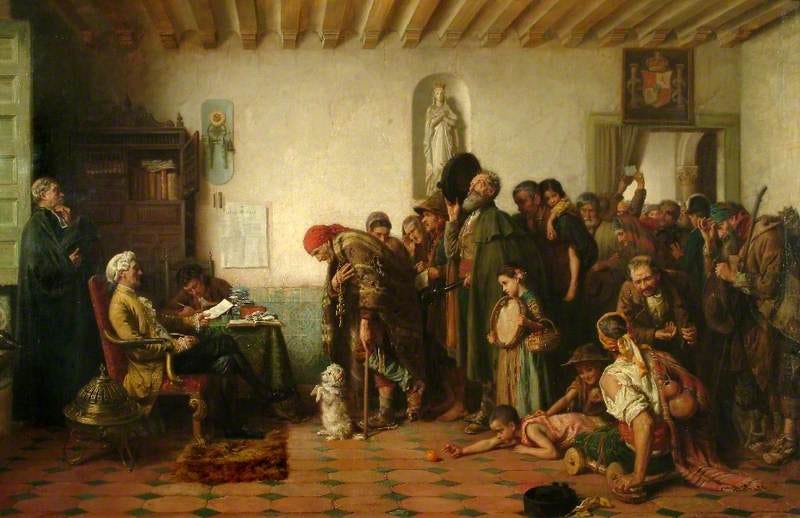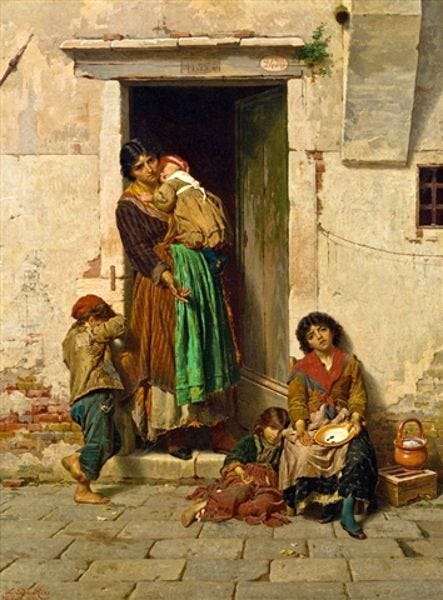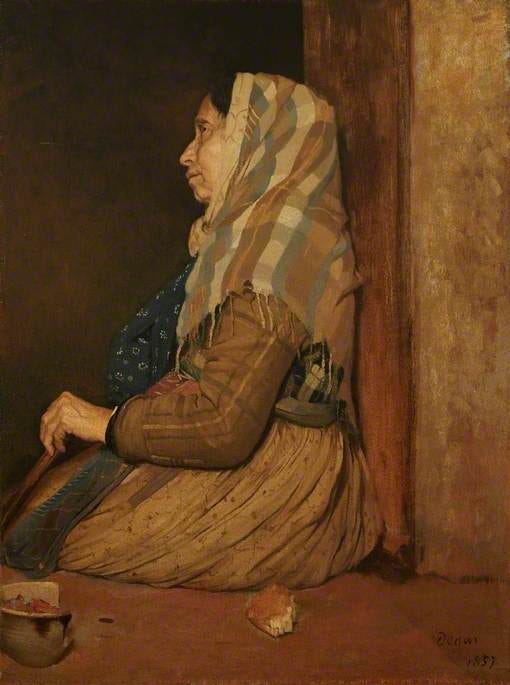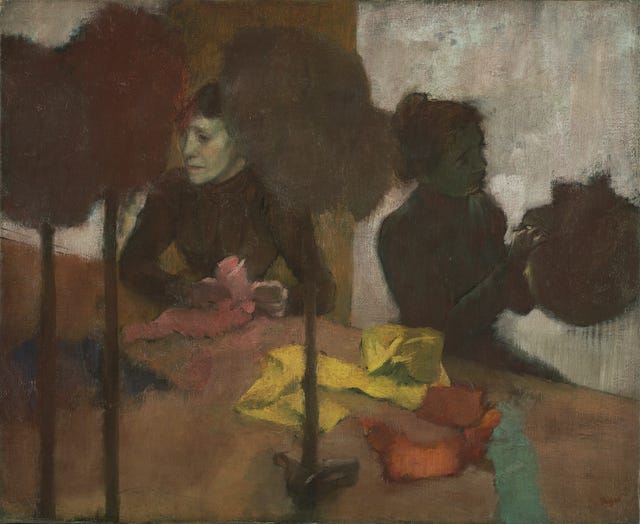“Blessed are the meek, for they shall inherit the earth.”
-Matthew 5:5 (ESV)

Burgess, John Bagnold. Licensing the Beggars in Spain. 1877, Royal Holloway, University of London.
“The little people are literally those who make no claims for themselves before God or before other people.”
-Dale Frederick Bruner (Matthew: A Commentary 165)
Good evening, good evening, good evening,
I hope this little newsletter finds you well. It’s looking like rain in Oklahoma, and I spent a lot of the day driving through tiny towns in the countryside with my dog. I’ve been working on a piece about the beauty of local theology—the idea that the Gospel message ought to be in conversation with the unique place its preached in.
As I drove through these tiny towns, I wanted to find quaint city streets filled with smiling old people trimming shrubs—Norman Rockwell and Mayberry and all that. Pristine slices of Americana lovingly conserved for generations to come.
Instead, there were dilapidated main streets and signs telling visitors about past prominence. One town said Clark Gable lived there for a while. Another town boasted that it was the birthplace of a famous ballerina. Still another proudly has a museum for a cartoonist most of America has forgotten. Storefronts are caved in or evacuated, and the kids grow up and move out, most likely not to return.
I got home mid-afternoon to write this introduction and send out this newsletter. This week’s newsletter is all about “meekness.” That word doesn’t get much traction these days, and when it’s used it’s often used as a sign of quaint righteousness—an elderly couple holding hands and praying. But to the ancient Jewish community, this word perhaps meant more like “overlooked” or “forgotten.”
Meekness might not be the image of the quaint small town with manicured lawns but the crumbling remains of a town no one sees.
This is the meekness I believe Jesus is talking about, and this is the meekness I’m excited to dive into this evening.
cheering for you,
drew

da Rios, Luigi. Beggar Family in Rome. 1844-1892.
People were bringing little children to Jesus for him to place his hands on them, but the disciples rebuked them.
-Mark 10:13 (ESV)
To these little children, Jesus probably seemed like a really important person—important enough for their parents to interrupt work on the farm or on the lake or in the market to bring them to meet him. Some only had begging to interrupt, and brought their kids anyway. These kids were called out of school, removed from their chores, buckled up in car seats, strapped to the backs of donkeys, lifted up on shoulders, and carried in bjorns all the way to Jesus.
When they arrived, there he sat—this important man. He didn’t look that much different from their fathers: his feet was dusty and his beard wasn’t trimmed. As they walked up, he looked at them and smiled. Their parents smoothed wrinkles out of clothes and tried to neatly part stubborn hair. It was time to meet him, to meet Jesus.
But then other men around Jesus frowned at them and said angry words to their parents. “He doesn’t have time to meet your children.” “He’s too busy.” “They can’t even appreciate Jesus the way he deserves.” They were like overworked mall cops at Christmas, shutting down the line because Santa only had time for people who arrived early and paid the entrance fee. Jesus didn’t give handouts.
When Jesus saw this, he was indignant. He said to them, “Let the little children come to me, and do not hinder them, for the kingdom of God belongs to such as these. Truly I tell you, anyone who will not receive the kingdom of God like a little child will never enter it.” And he took the children in his arms, placed his hands on them and blessed them.
-Mark 10:14-16 (ESV)
Jesus was indignant. These little children watched as Jesus split the angry men and called them forward. Hesitantly at first, they walked away from parents and grandparents and guardians and towards Jesus. He came down to their level, opened his arms, and blessed them. His feet were dusty, his beard wasn’t trimmed—he was one of them.
They were welcomed, and they were safe.
“Anyone who will not receive the kingdom of God like a little child will never enter it.”
Anyone. Anyone. Anyone.
The kingdom of God is for the little ones, the overlooked.

Degas, Edgar. A Roman Beggar Woman. 1857, Birmingham Museums Trust.
I bet I know what you’re thinking.
Children deserve Jesus because they’re innocent. They haven’t seen the things you’ve seen. They haven’t done the things you’ve done. Jesus knew they deserved his attention because they were pure but overlooked; you’re messed up and dirty and guilty and overlooked. There’s a difference, you say. Surely Jesus would rather spend his time with those kids, with anyone, rather than you.
Enter the woman at the well.
And [Jesus] had to pass through Samaria. So he came to a town in Samaria called Sychar, near the field that Jacob had given to his son Joseph. Jacob’s well was there; so Jesus, wearied from his journey, was sitting beside the well. It was about the sixth hour.
-John 4:4-6
Jewish people didn’t mess with Samaritans. They were seen as lower than low because they were of Jewish and Gentile descent. According to Jewish pharisees, Samaritans left the fold and were racially and ethnically inferior. Most Jews took the long way around Samaria in order to avoid getting their hands dirty. But Jesus went straight through, stopping at a well in the sixth hour—about noon—approaching the hottest part of the day.
A woman from Samaria came to draw water. Jesus said to her, “Give me a drink.” (For his disciples had gone away into the city to buy food.) The Samaritan woman said to him, “How is it that you, a Jew, ask for a drink from me, a woman of Samaria?” (For Jews have no dealings with Samaritans.)
-John 4:7-9
This woman came to the well when the sun was highest in the sky. It was just her and Jesus and a whole bunch of heat. Women never went to the wells at that time of day; they went in the early morning or evening, when the heat was at least subdued. But this woman went when everything was at its worst.
Why?
Because she didn’t belong with the other Samaritan women. This woman Jesus was talking to was an outcast from the Jews and an outcast from her own people. She came to the well when it was least likely for her to encounter anyone. Because she didn’t want to encounter anyone. No good could come from that. Yet here was this man, this Jesus.
Jesus answered her, “If you knew the gift of God, and who it is that is saying to you, ‘Give me a drink,’ you would have asked him, and he would have given you living water…. Whoever drinks of the water that I will give him will never be thirsty again. The water that I will give him will become in him a spring of water welling up to eternal life.” The woman said to him, “Sir, give me this water, so that I will not be thirsty or have to come here to draw water.”
-John 4:10, 14-15
She would take anything Jesus had if it meant she didn’t have to come to the well again, to have to make the walk of shame under that blistering sun.
Jesus said to her, “Go, call your husband, and come here.” The woman answered him, “I have no husband.” Jesus said to her, “You are right in saying, ‘I have no husband’; for you have had five husbands, and the one you now have is not your husband. What you have said is true.”
-John 4:16-18
There it was. That’s the reason she went to the well at noon, the reason she was an outcast: five husbands and a live-in replacement.
Women were not able to get divorces in those days—that was the right of the man. So five men had either died or divorced her; the house money was with the divorce. She—a Samaritan despised by the Jews—was not good enough for five separate men. She was despised by the Jews and by her own people. From the perspective of any upright individual, there was no one less worthy to be speaking to Jesus.
The whole time before Jesus brought up her domestic situation, she probably thought to herself: “If Jesus knew who he was talking to—if he really, really knew—he’d run to town with his disciples to avoid meeting me.”
But Jesus knew about her deepest shame and offered her living water. He knew the embarrassment, he knew it all, and he offered her the kingdom anyways.
blessed are the meek, for they shall inherit the earth.

Degas, Edgar. The Milliners. 1882, J. Paul Getty Museum, Los Angeles.
“Blessed are the meek.”
Blessed are you little ones. Blessed are you when you walk through hallways full of trophies but none with your name. Blessed are you when dating apps don’t produce dates, when dental check-ups and work appointments only fill your calendar, when you get fast food and eat in your car to avoid social interaction. Blessed are you when social media Christians fill your timeline with “Calling” and “Blessed” but you don’t have the time or income level to even spell those words. Blessed are you when you’re the profit that for-profit prisons utilize. Blessed are you when you lay in bed at night and stare at your ceiling wondering if anyone’s around. Blessed are you when everyone’s eye-line glides over you like planes over Oklahoma. Blessed are you when selective hearing never selects you, when your knee is scraped, and when you cry for help and no one shows up. Blessed are you when you make no claims and have no claims to make.
Your blessing is not dependent upon the latest polls or your approval ratings or how big your contact list is. There is no proof of identification, no take-a-number, no need to be a land-owning white man. When no one sees you, you are seen. When you can’t use #blessed, you are blessed. When the world looks for the person behind you, you are sought out and discovered.
“For they shall inherit the earth.”
A final thought:
Jesus tells the meek they will inherit the earth. There’s a real physicality to that, as if dilapidated storefronts will be restored and gardens will grow ripe fruit. There’s no timeframe given, but this idea is drenched in hope. I’m hopeful for you!
If this has brought up thoughts, or if you’re in the midst of a difficult season and want help, you aren’t alone. Here is a great website with resources for you. There are people who care!
-drew
P.S. If you are enjoying these little reflections, would you maybe think about sharing them? That would mean a lot to me!



Powerfully Healing Words... May have to re/read slowly to allow them to Penetrate the Prejudice denying the Compassion to Embrace/Join the Meek among us each day. Blessings...